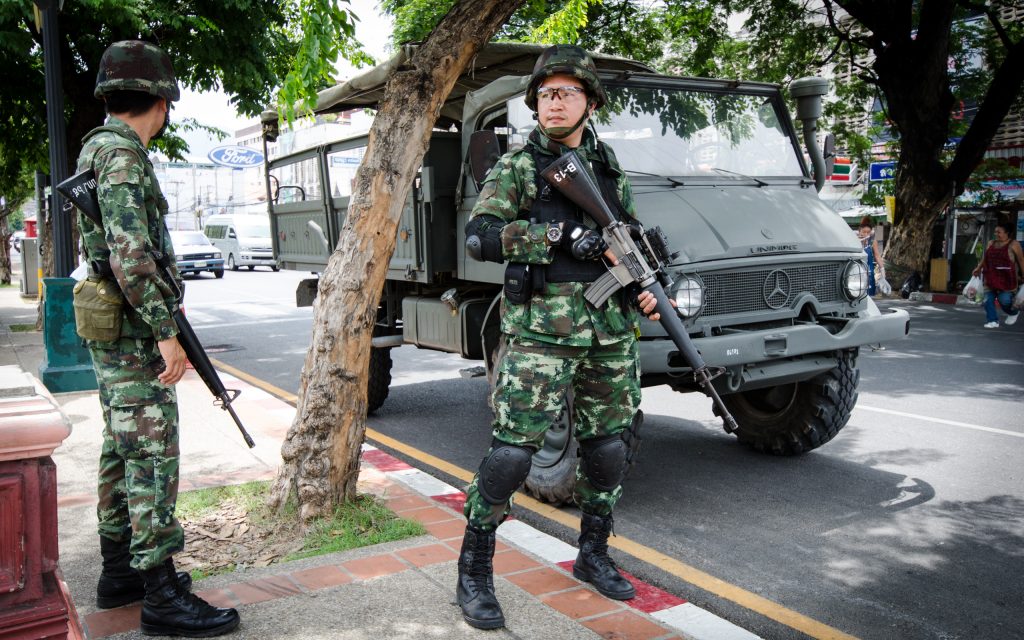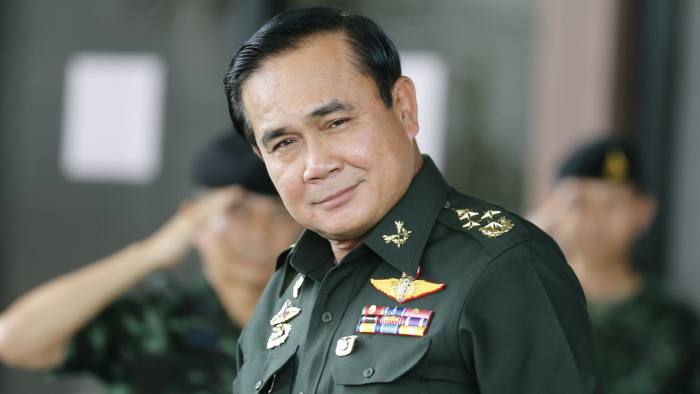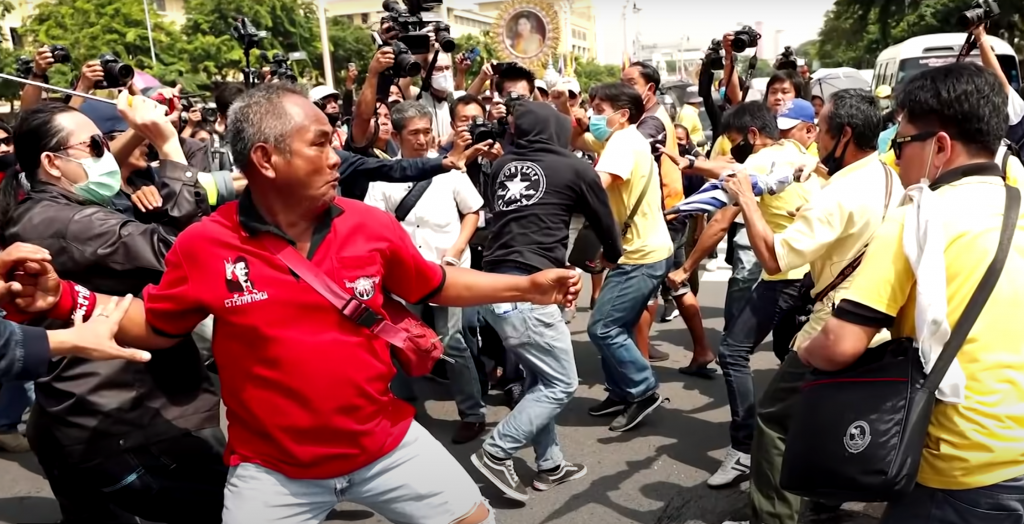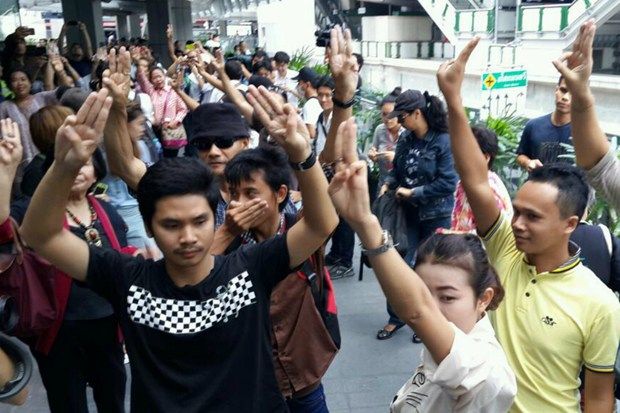Last Updated on 2021-09-22 , 4:07 pm
In an ideal world, an entire chocolate cake a day would keep the doctor away, napping would help you lose weight, and governments in every country would listen to the needs of their people.
But, alas, we live in a world where Donald Trump is president instead.
Today, however, we’re not talking about America’s problems.
Despite the fact that the coronavirus loves nothing more than large crowds, mass protests have been seen in several countries lately, including Hong Kong, South Korea, and the US.
Now, Thailand has been added to that list.
While some of you might have been to Thailand, with the sole intention of gobbling down green curry and mango sticky rice, you’re probably unaware that the country has been in political turmoil for the last six years.
In fact, the country has a long history of political unrest.

Mass protests against the government began in February this year, and were revived in July, amidst coronavirus restrictions.
Three months later, demonstrators are still taking to the streets.
So, what exactly are they protesting?
Here’s everything you need to know about the protests in Thailand.
A Brief History Lesson
In order to understand the reasons for the protest, you’ll need a brief history lesson. (Please try not to fall asleep like I did in secondary school).
Before 1932, Thailand used to be an absolute monarchy. This means that a monarch, such as a king, queen, or emperor, holds absolute power over the country, and is not restricted by laws, legislature, or customs.
This changed in 1932, however, when a political party, led by a comparatively small group of civilians and military, overthrew the King and his government, ending almost 800 years of absolute monarchy.
While this introduced democracy and the first constitution to the country, it would also lead to political instability in modern Thailand.
The Trigger: 2014 Military Coup
Since then, the country has been in such political turmoil that it has seen 12 military coups, where the military takes control of the government and holds power over the country.
The most recent coup occurred in 2014, when then-army chief Prayuth Chan-ocha announced that after months of political mayhem, the army had not only seized power of the government but had suspended the constitution too.

In addition, Chan-ocha suspended TV broadcasting and banned political gatherings, a portent of things to come.
Before the coup, the then-prime minister Thaksin Shinawatra had ordered the dissolution of the lower house of parliament, leading to his removal for an alleged abuse of power.
Chan-ocha replaced Shinawatra, and declared himself acting prime minister.

The Thai people were not pleased with this move, as it was viewed as undemocratic, and took to the streets in protest.
What further infuriated citizens was Chan-ocha’s decision to introduce a temporary constitution, which gave the military sweeping powers and also granted amnesty to those involved in all past and future military actions, including coups.
This would be a bit like if Goody Feed took over the Singapore government and introduced a law saying all coups involving media companies are permitted, and its participants will be pardoned.
Reason 1 for Current Protests: 2017 Constitution
Though Thailand’s constitution has been rewritten 20 times since 1932, the latest redraft in 2017 had ruffled a few feathers, to say the least.
Many believed the latest constitution had a number of anti-democratic elements, including:
- granting the junta (military) the power to select a prime minister for five years
- limiting the power of political parties if and when elections are held
- requiring any future government to adhere to a “legally binding 20-year-plan” for the country, created by Chan-ocha and his government
According to the Indian Express, the constitution has also increased the King’s constitutional powers, which many see as a threat to their democracy.
For instance, Thailand’s lese-majeste law, which forbids the insult of the monarchy, has been increasingly enforced ever since Chan-ocha and the military took control of the government in 2014.
Consequently, many people have been imprisoned for violating the law, which doesn’t give a concrete definition as to what an insult to the government is.
The Thai people feel that the King and the army have a symbiotic relationship where both support each other, ultimately undermining democracy for the sake of staying in power.
Reason 2 for Current Protests: 2019 Election & Dissolution of Opposition Party
Remember Chan-ocha? Try not to forget his name, because he’s actually the main reason the Thais are protesting right now.

Citizens were already indignant about Chan-ocha’s rise to power and him declaring himself prime minister in 2014, after seizing control of the government.
But anger only grew after a controversial general election in 2019.
Despite the fact that the incumbent’s main opposition party – Pheu Thai – won more seats in parliament than anyone else, they didn’t get to choose the country’s prime minister.
As previously mentioned, this power lies with the military, who, unsurprisingly, chose to keep Chan-ocha in power as prime minister.
As a result, the election was seen as undemocratic and unfair, and the hashtags #RIPTHAILAND and #NotMyPM trended on Twitter for days, according to the Indian Express.
Then, things came to head in Feb 2020, when an opposition party was dissolved.
One of the most popular parties during the 2019 general election was the Future Forward Party (FFP), which managed to win the third-largest share of seats thanks to the support of progressives and youths.
The FFP championed abortion rights, women’s rights, and labour rights, among many other policies which their supporters viewed as an alternative to traditional political parties.
However, in Feb 2020, the FFP was ordered to dissolve for allegedly violating election laws.
Its popular leader – Thanathorn Juangroongruangkit – was accused of loaning money to his party, the FFP, which was deemed a donation, making it illegal.
As a result, the party was forced to disband, and demonstrators staged mass protests in response.
Resurgence of Protests in July
Protests were halted by Covid-19 restrictions, which many saw as a pretext to cease protests.
But demonstrations erupted again just a few months later in July.

The Thai people had the same motives in mind, but their anger against the government was amplified by the impact of the pandemic, which has left thousands jobless and the economy in tatters.
To rub salt into Thai wounds, the government has been violently cracking down on protestors who have been demonstrating in phases since July.
Recently, the government ordered a ban on protests, limiting public gatherings to groups of no more than five people.
Tens of thousands of people defied the order and took to the streets in Bangkok to demonstrate, according to Al Jazeera.
50 people have been arrested in the past week, and many protestors have been met with fierce resistance.
According to Vox, the riot police have unleashed water cannons containing a chemical irritant on crowds, among other intimidatory tactics.
Now, thousands of people are demonstrating in Bangkok despite the ban, many of whom have donned hard hats, expecting a steely response from the authorities, even though their protests have largely been peaceful.
“Violent or not, all gatherings are illegal,” police spokesman Yingyos Thepjamnong said at a news conference.
So, What Do Protestors Want?
Though demonstrators have many demands, their primary aim is to remove Chan-ocha from power.
This is why chants of “Get Out” can be heard outside Thai schools and universities at the moment a demand directed at the country’s prime minister.
So, to sum up, here’s what the Thai protestors want:
- To reverse the constitutional amendment that granted the King more constitutional power
- To repeal the lese-majeste law
- For the king to relinquish control of a palace fortune, estimated to be worth tens of billions of dollars
- For Chan-ocha to resign
- For parliament to be dissolved
- For the constitution to be rewritten
- For the authorities to allow peaceful protests without intimidation or violence
- To reform the monarchy, limiting its powers and making it more accountable to elected institutions
- An abolition of the military-appointed Senate
Even with the violent crackdown on protestors, which has been criticised by several international organizations, Thai protestors have not lost their fighting spirit.
Many of them have chosen rather inventive methods of protest, such as dressing up as characters from Harry Potter and using a three-finger salute, inspired from the Hunger Games series.

These protestors seemed determined to have their demands met, no matter the cost.
“The goal is to change the whole political system, including the monarchy and the prime minister,” one Bangkok student told the New York Times.
Would you be jailed for being half-naked in public? Well, the answer will shock you. Seriously. Watch this to the end and you'll understand:




